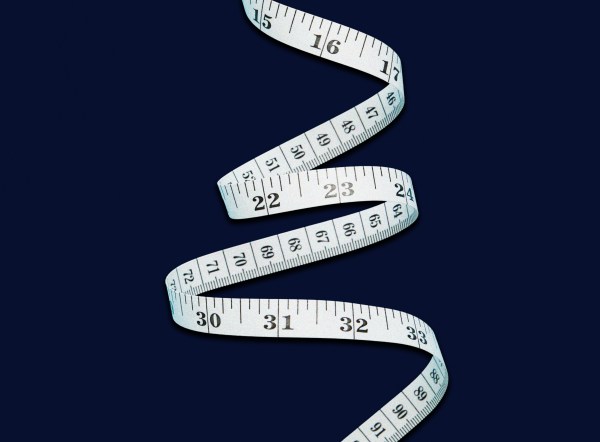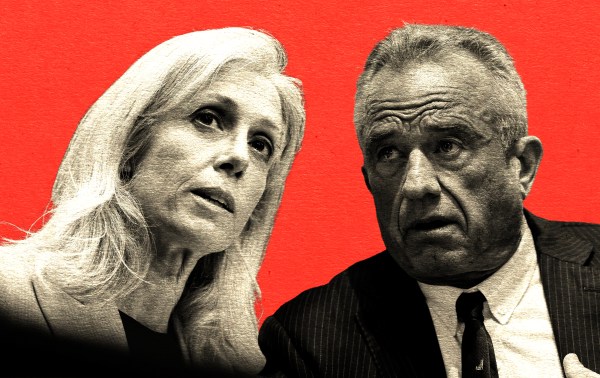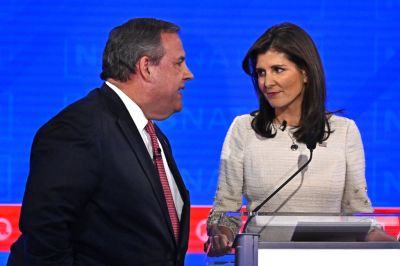There are two new polls today of the Republican primary in New Hampshire. Having digested both, I’m going to do something wildly out of character.
I’m going to focus on the optimistic one.
A new survey from Suffolk has Donald Trump routing Nikki Haley there, 46 percent to 26 percent. We’re dumping that one straight into the shredder in the name of Keeping Hope Alive. It’s the other poll, from CNN, that’s worth our time.
Trump 39, Haley 32, Christie 12.
Skim through other recent polling of the state and you’ll notice two things. One is that Trump is consistently below 50 percent. He’s secured majority support just once in the last 10 New Hampshire surveys, and now stands at an underwhelming 43 percent in the RealClearPolitics (RCP) average.
The other is that Haley’s and Christie’s combined support is within 10 points of the lead in all but one of the last five polls taken and is within 2 points(!) of the lead in the overall RCP average. With the help of an endorsement from Gov. Chris Sununu, Haley has more than doubled her share of the vote in the state since mid-November. And the CNN poll is a new milestone: For the first time, she’s within single digits of Trump all by herself.
This could matter.
For starters, it could matter next Monday in Iowa. If you’re an undecided Republican voter there who dislikes Trump but prefers Ron DeSantis to Haley, the New Hampshire trends might make you reconsider your preference. DeSantis is a lost cause in Sununu’s state, averaging just 6.3 percent, which means he’s unlikely to convert a second-place finish in Iowa into any meaningful momentum. The more polling we get from New England in the next few days showing Haley competitive with Trump, the stronger the argument becomes for DeSantis supporters in Iowa to ditch him for strategic reasons and give her a boost instead.
The polling could also matter to Trump’s campaign messaging. As much as he’d like to pretend that “birdbrain” is no threat to him, his campaign has begun running ads in New Hampshire against her. The stronger Haley’s polling gets, the more outrageous Trump’s attacks will become. This charming post was promoted on his Truth Social account just yesterday, in fact:
Yes, he’s really calling for Haley to be disqualified from the race at a moment when he’s otherwise screeching nonstop about how “anti-democratic” disqualifying him from the race would be. If she beats expectations in Iowa, there’s no telling how nasty and deranged the kitchen-sink MAGA messaging effort to stop her in New Hampshire might get. Or how that might backfire among the state’s more moderate Republican electorate.
The most obvious consequence of Haley’s numbers rising, though, is how that matters to Chris Christie. Until today, there was no statistical evidence that she would win New Hampshire if he quit the race and freed his voters to support her instead. With the release of the new CNN poll, that’s no longer true. If those numbers are accurate, he’s now poised to play spoiler and tilt the state to a man whom he’s sworn up and down is unfit for the presidency.
So we return to a topic we first considered last week. What should Chris Christie do?
Given the exceedingly long odds that Haley will end up defeating Trump for the nomination, should he even care if she wins New Hampshire? Should we?
I think we should, while remaining sober enough to recognize that Trump is quite likely to obliterate her once states that are redder than Sununu’s start voting.
“Moral victories” rarely mean anything in politics, but losing New Hampshire would dent Trump’s aura of invincibility in a way no Republican has managed to do since he conquered the GOP in 2016. Apart from a few tense days in early January 2021, there’s been no hint in almost a decade that his party is anything less than aflame with enthusiasm for him.
Losing the first primary on the calendar would suddenly and dramatically call that into doubt.
If it’s true that Trump’s stature in this year’s race is more akin to an incumbent president running for reelection than to a garden-variety frontrunner, dropping any contest to an upstart challenger should be seen as an earth-shaking expression of doubt in his leadership. In 1992, when Pat Buchanan took 40 percent of the vote in New Hampshire against George H.W. Bush, the New York Times pronounced it a “jarring political message” and a “roar of anger” from disgruntled Republican voters. In hindsight it would be interpreted as an early warning that the president would struggle to hold his base together in the general election.
Bush defeated Buchanan in that New Hampshire primary by 18 points, by the way. Imagine Trump, the cult leader and Republican colossus, outright losing to Nikki Haley there.
It won’t matter, you say. Because Democrats and independents can vote in the Republican primary in New Hampshire, Trump will whine that Haley owes her victory to leftist “vermin” who crashed the party to vote for her. True, he will say that. He might even be right! Again, we should suffer no illusions that she’ll parlay an upset in Chris Sununu’s state into a national victory.
But even a victory fueled by members of the other party has an upside for her. Haley has argued for months that she’s the candidate in the field who’s most likely to beat Joe Biden; some polling backs her up on it. If independent and Democratic votes propel her to a win in New Hampshire, that’s more evidence she can tout that Americans who wouldn’t dream of supporting Trump in the general election will give her a serious look.
Populists will hold her crossover appeal against her, of course, convinced as they are that if Democrats find something to like about a Republican, it must be because that Republican sold out to the “uniparty.” (Only by losing elections does one prove one’s uncompromising right-wing authenticity.) But electability might be worth something to the rational minority of normie Republicans casting ballots in more than a dozen states on Super Tuesday. The more Haley overperforms in those primaries, even in defeat, the weaker Trump’s pretensions to leading a vengeful popular groundswell against the deep state will appear.
And anything that weakens Trump is good. The more divided and embittered the Republican Party is left by its primary, the harder it’ll be for him to assemble a winning coalition in the fall.
Winning New Hampshire might also give Haley a puncher’s chance at a second, far more impressive upset in South Carolina. Southern and solidly conservative, that’s supposed to be Trump Country. But it’s Haley’s home state, of course, so the momentum she might enjoy there following an unexpected victory up north is hard to predict. If she returns home having just pulled off the most exciting upset in Republican politics since 2016, with her chances at mounting a truly national campaign against Trump now in the hands of the voters who elected her governor twice, what do those voters do?
They vote for Trump, almost certainly. But “almost certainly” is as far as I’m willing to go.
A victory in New Hampshire would do something else for Haley. As absurd as it might seem, it would make her the presumptive back-up nominee if something happened to Trump before November.
I call it absurd because MAGA influencers like Steve Bannon are at this very moment angling to read her out of the party, alarmed by her rise in New Hampshire and mortified by the thought of an establishmentarian as quintessential as her landing on the national ticket with Trump. If Haley really does shock the world in the Granite State, she’ll zoom past Liz Cheney overnight as the Republican whom populists most love to hate.
But if she manages to defeat Trump in a key early state, what’s the argument for Republican Party bigwigs choosing someone else as nominee if he’s unable to make it through the general election? (Being sent to prison won’t stop him. I’m thinking about a health crisis here.) There’s a rational case to prefer Ron DeSantis as standard bearer, as he’s more acceptable to both wings of the party. There won’t be a populist boycott of the general election if he’s the nominee as there might be if Haley is.
Yet it would feel ridiculous to pass over a candidate who beat Trump head-to-head in a primary in favor of one who badly underperformed expectations as a candidate, spent boatloads of money to no effect, presided over a dysfunctional operation, and may well end up finishing third in Iowa before quietly leaving the race next week. (DeSantis trails Haley ever so slightly in the latest average of that state.)
Choosing the lackluster governor of Florida over the impressive former governor of South Carolina feels like a recipe for hard feelings among Haley’s admirers. And it might not solve the GOP’s populist turnout problem in the end: MAGA voters have spent the past year being conditioned daily to view DeSantis as a pitiable substitute for the greatness that is Trump.
A Haley win in New Hampshire, therefore, means even more chaos than expected in the event of a Trump-sized power vacuum at the top of the GOP. And having this illiberal, conspiratorial, aggressively anti-intellectual party hamstrung by maximum chaos in an election year is worth rooting for.
If nothing else, seeing the very definition of a pre-Trump mainstream conservative like Haley bump him off in the Granite State might give populists pause about the “hostage crisis” in which the American right has found itself over the past eight years. There’s a lot of wishful thinking in the word “might” there, I concede, but if normie Republicans retain enough political muscle to embarrass Trump in a key race (with help from Democratic and independent crossovers, to be sure) then perhaps they can’t be taken for granted as much as populists would like to believe. A Haley upset in New Hampshire would shift the balance of power in the party away from crazy and toward sane—a little. A teeny, tiny smidge.
All of which brings us back to Chris Christie.
As I’ve just explained, there’s a lot potentially riding on his decision either to stay in the race through New Hampshire or to drop out before the primary and give Haley a clear shot at consolidating sane Republicans against Trump. What should he do?
I think he should make her an offer.
In saying that, I’m paying Christie the compliment of presuming that his goal in this cycle is nothing less virtuous than making sure Trump doesn’t end up back in power. He can’t be so delusional as to think he has a shot of becoming the Republican nominee himself, right? Even in New Hampshire, where he’s spent months campaigning, his net favorability among GOP primary voters is 40 points underwater.
His purpose in the race, as I understand it and as I hope he understands it, is to convince as many Republican voters as possible that they shouldn’t support Trump in the general election. The fact that they dislike Joe Biden and the Democrats is neither here nor there. A candidate who’s grossly unfit for office can’t be trusted with that office, period.
If I’m right about his intentions then here’s what Christie should offer Haley: In exchange for him quitting the race before New Hampshire votes, she must pledge to him privately that she won’t endorse Trump after the primary ends.
To borrow a line from last week’s newsletter, he should demand that Haley shed her identity as a candidate of accommodation and join him in becoming a candidate of schism, even if only secretly.
The reason Christie should prioritize that is because Haley could end up wielding influence over whether the GOP ultimately unites behind Trump before November. The more support she attracts in the primary, the more divided the two wings of the party will become; once she’s out of the race, Trump and other GOP chieftains will demand that she help heal the rift by endorsing him and campaigning for him.
Even in defeat, she’ll have established herself as one of the most formidable traditional conservatives in the country. Some of her voters will be watching her to see if she signals “permission” to lay their disaffection with Trump aside and to support him over Biden as the lesser of two evils. What will she say?
Christie has meaningful leverage at the moment to ensure that, at worst, she says nothing. Given her future ambitions, it’s too much to expect her to endorse Biden. But she can certainly stay true to the spirit of what she said about Trump at her recent televised town hall on CNN: “The reality is, rightly or wrongly, chaos follows him, and we all know that’s true … and we can’t have a country in disarray and a world on fire and go through four more years of chaos. We won’t survive it.”
We won’t survive it. Rationally it should be impossible to get from that point A to the point B of endorsing Trump, but I’d bet every dollar I have that Nikki Haley intends to do so—unless someone makes it worth her while not to.
Christie can. And he can make his offer to her knowing that if Haley calls his bluff by turning him down, the cost of him staying in the race and complicating her path to victory in New Hampshire will have gone way down as a result. If she intends to use the clout she might gain from an upset in the Northeast to no nobler purpose than getting Trump reelected president (“we won’t survive it!”) then whether she wins Chris Sununu’s state or whether Trump wins it is largely academic. Damaging him by beating him and then turning right around and helping him repair the damage would be a ludicrous, disgraceful exercise.
If, meanwhile, Haley were to accept Christie’s offer and then double-cross him by endorsing Trump after the primary anyway, Christie could make her pay politically by publicly revealing the terms of their bargain. There’d be some pain for Haley in having it confirmed for the world that she’s precisely the sort of two-faced careerist cynic that she’s sometimes cracked up to be.
I don’t think she’ll double-cross him, though. Frankly, it’s in Haley’s interest to accept the offer and stick to its terms.
That’s debatable, of course. Refusing to endorse Trump after he becomes the nominee would make her enemies up and down the ranks of the party, starting, of course, at the very top. It would cost her any chance she has of becoming Trump’s running mate—and those chances will improve if she demonstrates her political strength by winning New Hampshire. It would also ensure that she’ll be scapegoated by MAGA sycophants eager to exculpate their master if Trump ends up losing to Biden this fall. She would end up forfeiting whatever chance she has of succeeding him as Republican nominee in 2028, which has surely been her ultimate endgame in this year’s effort.
But c’mon. Nikki Haley isn’t going to be the nominee in 2028 regardless.
The Republican Party will hopefully lose its insatiable appetite for demagogues over time, but even today’s optimistic mood won’t let me keep a straight face when considering whether it might happen as soon as four years from now. There’s little to add to yesterday’s newsletter on that point: A party that’s remade itself into a religious revival brimming with romantic narratives about revolution against a sinister cabal isn’t going to nominate someone prone to droning on about deficits and “consensus” on abortion. The thrilling “bespoke realities” Republican voters have fashioned for themselves have no place for a politician as pedestrian, or as sensible, as Nikki Haley.
The political hand Haley holds right now is the strongest one she’s ever going to hold. She stands a meaningful chance of defeating Donald Trump in an influential state primary, particularly if Christie withdraws, and a non-zero chance of winning at least one more. She should make peace with that fact and do something good for her country and her political legacy in deciding how to play her cards.
If I were her and Christie made that offer, I’d accept it, give it my best shot in New Hampshire and South Carolina, and then spend the rest of this year scrupulously declining every invitation to endorse the Republican nominee. All she’ll have left after the primary is the credibility she’s earned by making a good show of her campaign. She should emphatically not squander it on a cretin like Donald Trump.







Please note that we at The Dispatch hold ourselves, our work, and our commenters to a higher standard than other places on the internet. We welcome comments that foster genuine debate or discussion—including comments critical of us or our work—but responses that include ad hominem attacks on fellow Dispatch members or are intended to stoke fear and anger may be moderated.
With your membership, you only have the ability to comment on The Morning Dispatch articles. Consider upgrading to join the conversation everywhere.